Trump Says “Republicans Have Never Been So United.” He’s Delusional.
As the party’s immediate former president, a virtual incumbent, he’s losing over a third of the vote in the primaries and caucuses.
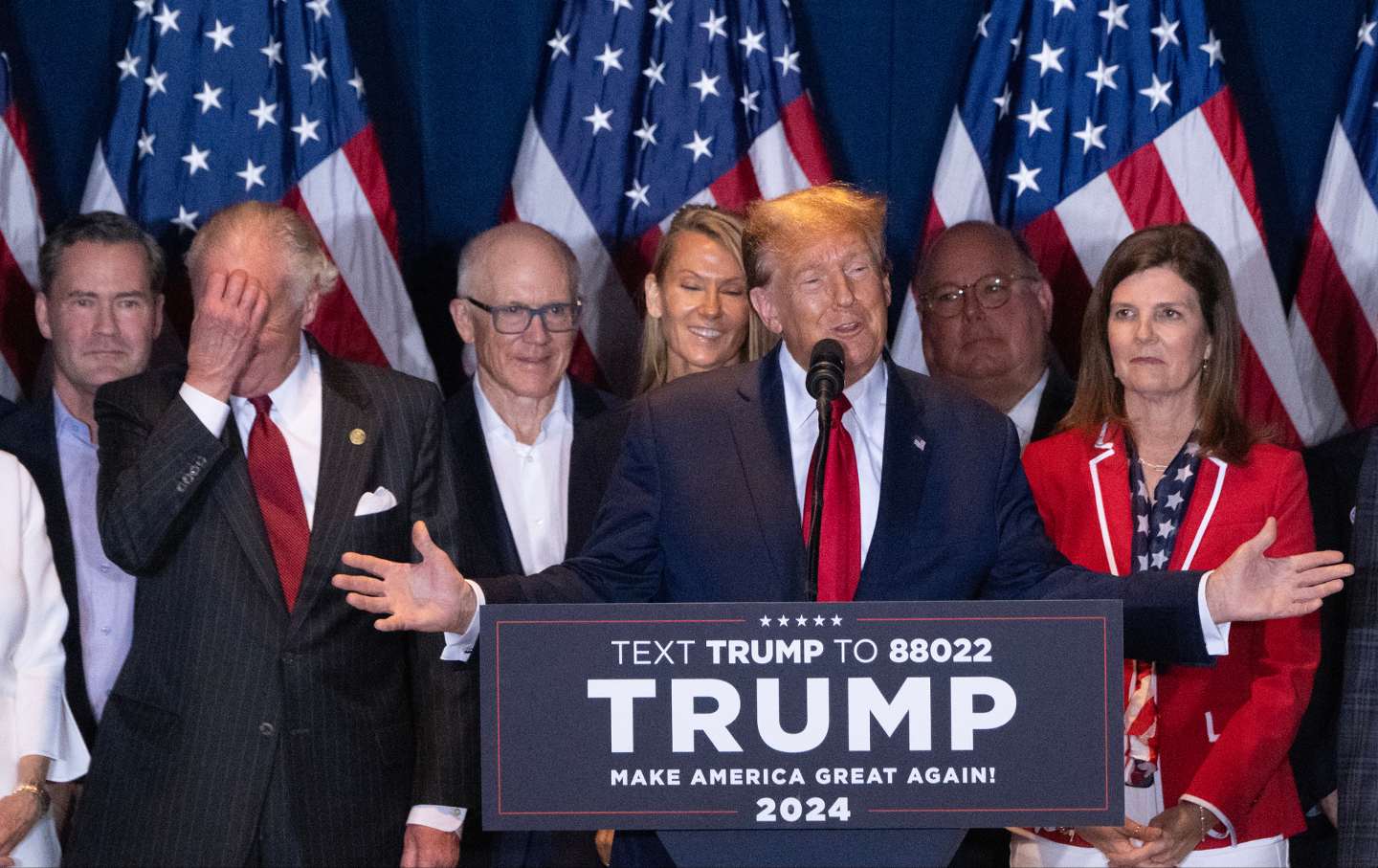
Donald Trump speaks during an election-night watch party at the South Carolina State Fairgrounds in Columbia on Saturday, February 24, 2024.
(Victor J. Blue / Bloomberg via Getty Images)After losing 40 percent of the vote in South Carolina’s presidential primary on Saturday, Donald Trump claimed, with his usual combination of bravado and delusion, “I have never seen the Republican Party so unified as it is right now.”
That’s a lie that Trump likes to tell himself. But none of the rest of us have to believe it.
The fact is that the base of potential Republican voters is deeply divided about Trump, and that’s very good news for Joe Biden and the Democrats.
Trump is all but certain to be the Republican nominee in 2024. But he will run as a wounded candidate who is far more vulnerable to losing a substantial portion of his base than past GOP nominees who were in similar circumstances.
Trump’s circumstance is this: He’s not running for reelection from the White House, as he did in 2020. But he is his party’s most recent president, and less than four years ago he secured the second-highest level of support ever in a November presidential election. He has Taylor Swift–level name recognition. He’s supported by almost every prominent Republican who has made an endorsement this year, including scads of governors, senators, and House members.
In other words, he’s as close as Republicans will get this year to running an incumbent.
Yet Trump is not gaining anywhere near the sort of support that incumbent Republicans—or even prominent front-runners—received in the past.
After five primary and caucus contests, he’s winning under 59.5 percent of the overall total of votes cast. Most of the remaining votes have gone to the hapless candidacy of Trump’s last remaining “name” rival, former South Carolina governor Nikki Haley.
The 36.8 percent of the overall vote that Haley has secured following contests in Iowa, New Hampshire, Nevada, the Virgin Islands, and South Carolina is not a measure of her personal popularity. It’s a measure of the opposition to Trump within his own party.
A very high measure, when seen in the perspective of past Republican nomination contests.
In 1980, when Ronald Reagan was mounting his third bid for the presidency, as a nonincumbent running in a multicandidate field for the GOP nod, he won roughly 60 percent of the overall primary and caucus vote.
In 1984, as an incumbent seeking reelection, Reagan won 98.8 percent.
In 1988, when Reagan’s vice president, George H. W. Bush, was running as a a nonincumbent in a crowded contest for the Republican nomination that included senators, cabinet members, and religious broadcaster Pat Robertson, he won 67.9 percent of the overall primary and caucus vote.
In 1992, when Bush was running for reelection, he won 78.2 percent of the overall primary and caucus vote. The fact that 23 percent of the vote went to syndicated columnist Pat Buchanan was seen as a serious problem for Bush, who felt compelled to try to unite the party by offering Buchanan a speaking slot at that summer’s Republican National Convention. That went horribly, as Buchanan delivered a divisive “culture wars” speech that contributed to Bush’s loss in November.
Haley has already run considerably better than Buchanan and could continue to do so for as long as she can maintain a candidacy that took a hit over the weekend when the circle of billionaire donors associated with Charles Koch signaled that it would stop funding her bid.
Haley, whose delegate count stands at 20, versus 110 for Trump, never had a realistic chance of being the Republican nominee. She’s likely to suspend her bid before the primary season is done. And, in the unlikely event that Trump is forced to stand down—presumably, with the right combination of convictions from his 91 criminal indictments—there’s little chance that MAGA delegates to the Republican National Convention would turn to the former governor of South Carolina, whom Trump has been slurring for months with an openly racist, sexist, and xenophobic campaign that seems to delight his base.
Haley has maintained her bid in order to claim a role in defining the future of the party, and South Carolina gave her a credible argument for her continued candidacy. She was winning two-fifths of the total in her home state, where the Republican governor and both US senators, as well as the rest of the party establishment. backed Trump.
Popular
“swipe left below to view more authors”Swipe →Haley observed, “I know 40 percent is not 50 percent. But I also know 40 percent is not some tiny group.”
That’s exactly right. It is not a small group.
Haley’s primary numbers have confirmed that the GOP is divided over Trump.
He’s losing a higher percentage of the vote than Republican presidential contenders in similar positions to his own. And exit polls show that Republican primary voters who are rejecting him are doing so for a reason: They’ve got qualms about his fitness for the office. Those concerns would be confirmed by a criminal conviction.
In South Carolina, a conservative Republican stronghold, 36 percent of GOP primary voters said they’d consider Trump unfit for office if he were to be convicted of a crime—a very real prospect, as several of the former president’s many trials are likely to be scheduled for before the 2024 election.
In New Hampshire, an actual battleground state, the “Trump would be unfit” number among Republican primary voters was 47 percent.
“The GOP primary has laid bare the stark and indisputable reality that while Trump has the united support of his MAGA base, he is struggling to make himself palatable to these key constituencies that will ultimately decide the election this November,” explained Quentin Fulks, Biden’s deputy campaign manager, after a review of the New Hampshire numbers.
Nothing about that calculus has changed in the month since New Hampshire voted. In fact, while Trump and his aides talked about finishing off Haley in her home state, she actually ran better than many pollsters and pundits had anticipated.
The Haley vote can be seen as a base of discontented Republicans and Republican-leaning independents. Many of them may stand down and simply not vote in November, or perhaps back a third-party candidate. Some could cross over and vote for Biden—especially in battleground states such as New Hampshire, Nevada, Wisconsin, Michigan, and Pennsylvania.
That explains why MSNBC host Lawrence O’Donnell, a veteran political aide with considerable experience observing questions of party unity, remarked as the South Carolina votes were being counted, “These numbers are disastrous for Donald Trump.” Noting that Biden, running as the Democratic incumbent, won 96 percent of the vote against an actively campaigning Democratic congressman and a best-selling author and 2020 presidential contender, O’Donnell said Saturday night, “That’s what you’re supposed to get, and Donald Trump’s not going to come close to that.”
O’Donnell is no fan of Trump. But no matter his political persuasion, his point is well-taken. As is his argument that “all you need is 5 percent of [Haley’s total]—we’re talking about a sliver—that’s all you need to not vote for Donald Trump in Michigan, in Pennsylvania, in Arizona, in Georgia,” in order for Biden to win those battleground states in November.
Trump can talk all he wants about a “unified” Republican Party. He’s wrong. It’s deeply divided, and Joe Biden’s reelection bid will benefit from that division.
We cannot back down
We now confront a second Trump presidency.
There’s not a moment to lose. We must harness our fears, our grief, and yes, our anger, to resist the dangerous policies Donald Trump will unleash on our country. We rededicate ourselves to our role as journalists and writers of principle and conscience.
Today, we also steel ourselves for the fight ahead. It will demand a fearless spirit, an informed mind, wise analysis, and humane resistance. We face the enactment of Project 2025, a far-right supreme court, political authoritarianism, increasing inequality and record homelessness, a looming climate crisis, and conflicts abroad. The Nation will expose and propose, nurture investigative reporting, and stand together as a community to keep hope and possibility alive. The Nation’s work will continue—as it has in good and not-so-good times—to develop alternative ideas and visions, to deepen our mission of truth-telling and deep reporting, and to further solidarity in a nation divided.
Armed with a remarkable 160 years of bold, independent journalism, our mandate today remains the same as when abolitionists first founded The Nation—to uphold the principles of democracy and freedom, serve as a beacon through the darkest days of resistance, and to envision and struggle for a brighter future.
The day is dark, the forces arrayed are tenacious, but as the late Nation editorial board member Toni Morrison wrote “No! This is precisely the time when artists go to work. There is no time for despair, no place for self-pity, no need for silence, no room for fear. We speak, we write, we do language. That is how civilizations heal.”
I urge you to stand with The Nation and donate today.
Onwards,
Katrina vanden Heuvel
Editorial Director and Publisher, The Nation
More from The Nation
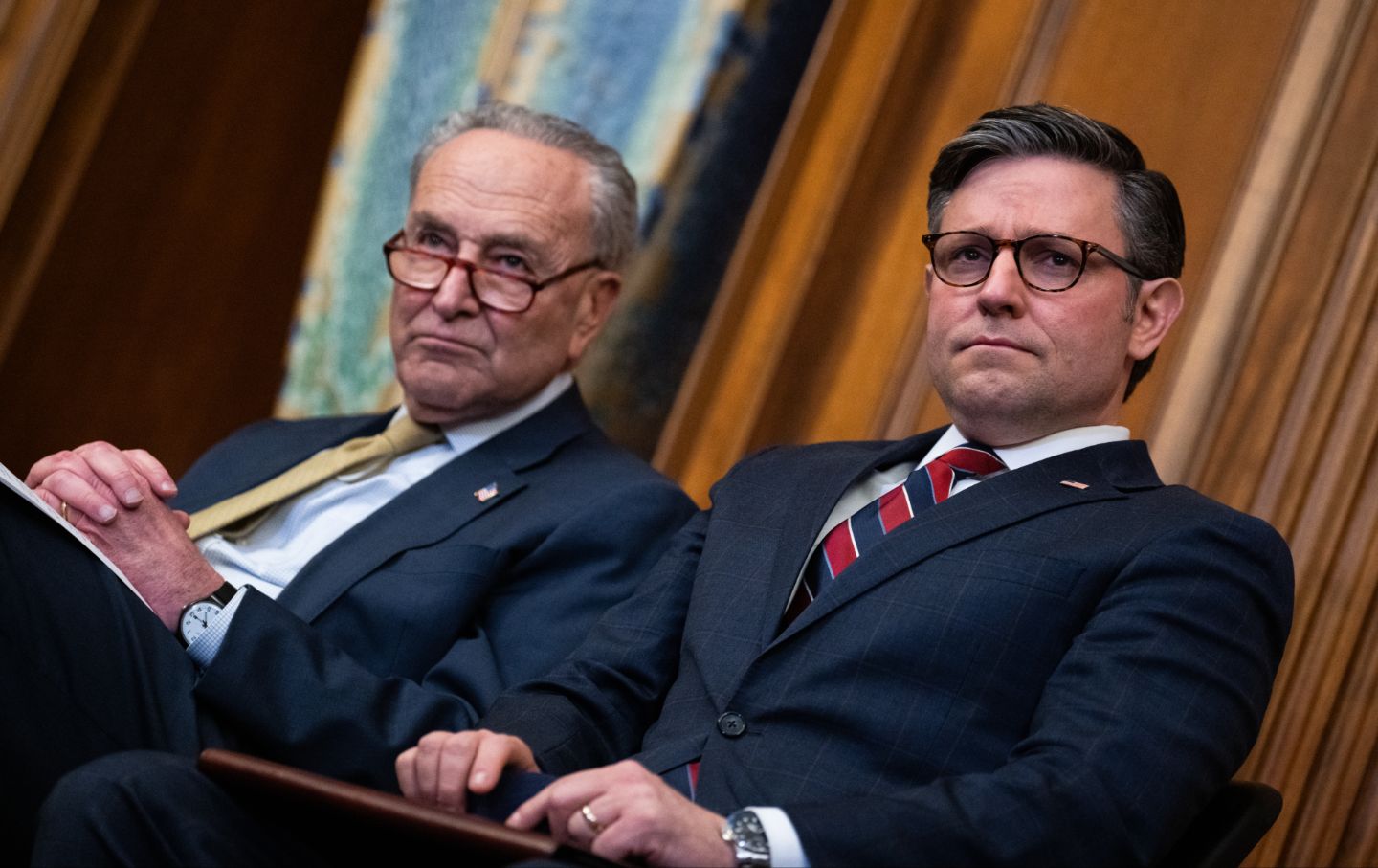
Democrats Must Do Everything They Can to Block the Dangerous Non-Profit Bill Democrats Must Do Everything They Can to Block the Dangerous Non-Profit Bill
The House passed a bill aimed at giving the government sweeping powers to crush non-profits and attack supporters of Palestine. Democrats need to stand firmly in its way.
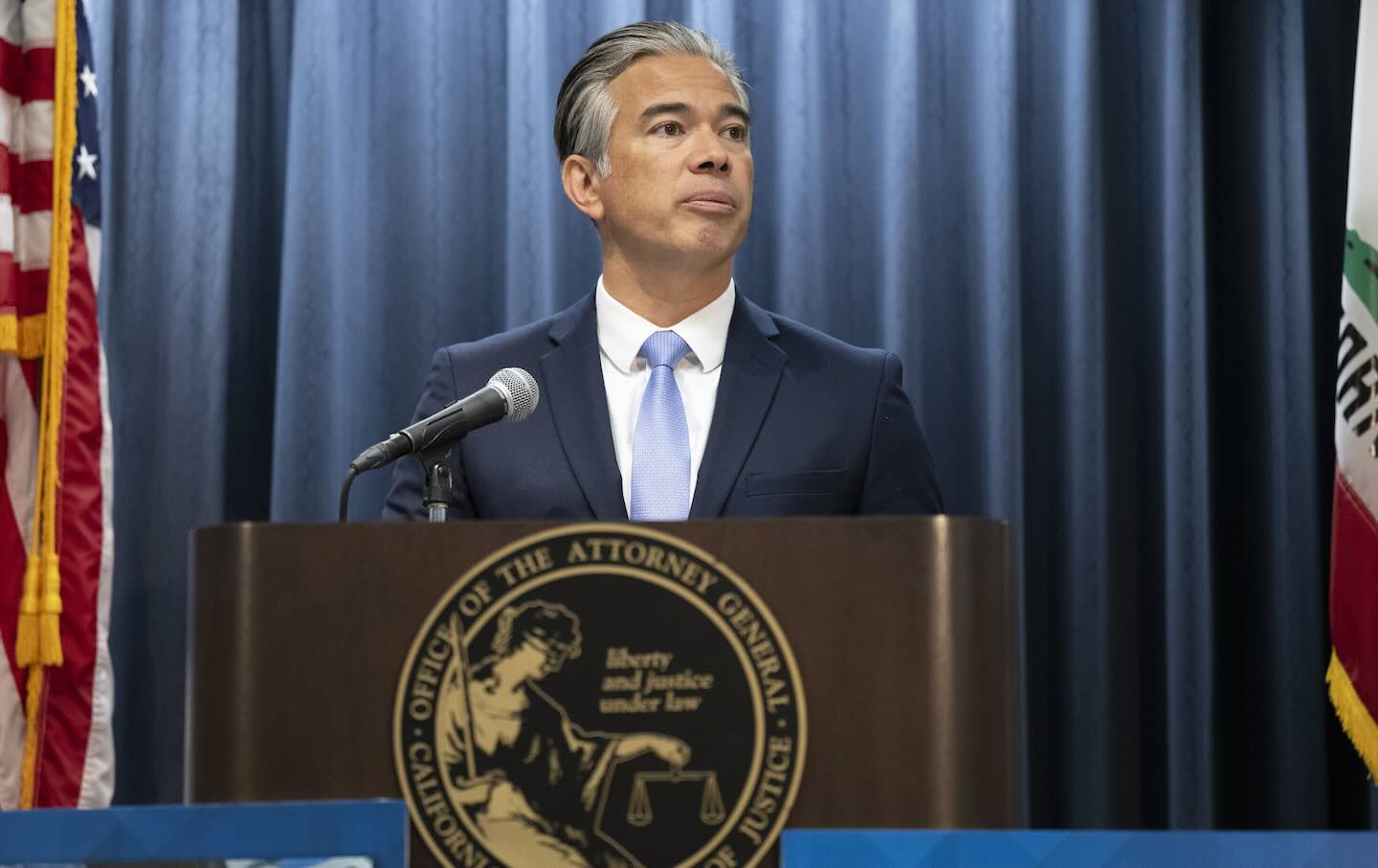
California Is Ready to Go Toe to Toe With Trump 2.0 California Is Ready to Go Toe to Toe With Trump 2.0
“We’ve thought about all the possibilities, and have prepared for every one of them,” said AG Rob Bonta, “and are ready to take action when there’s any unlawful activity.”
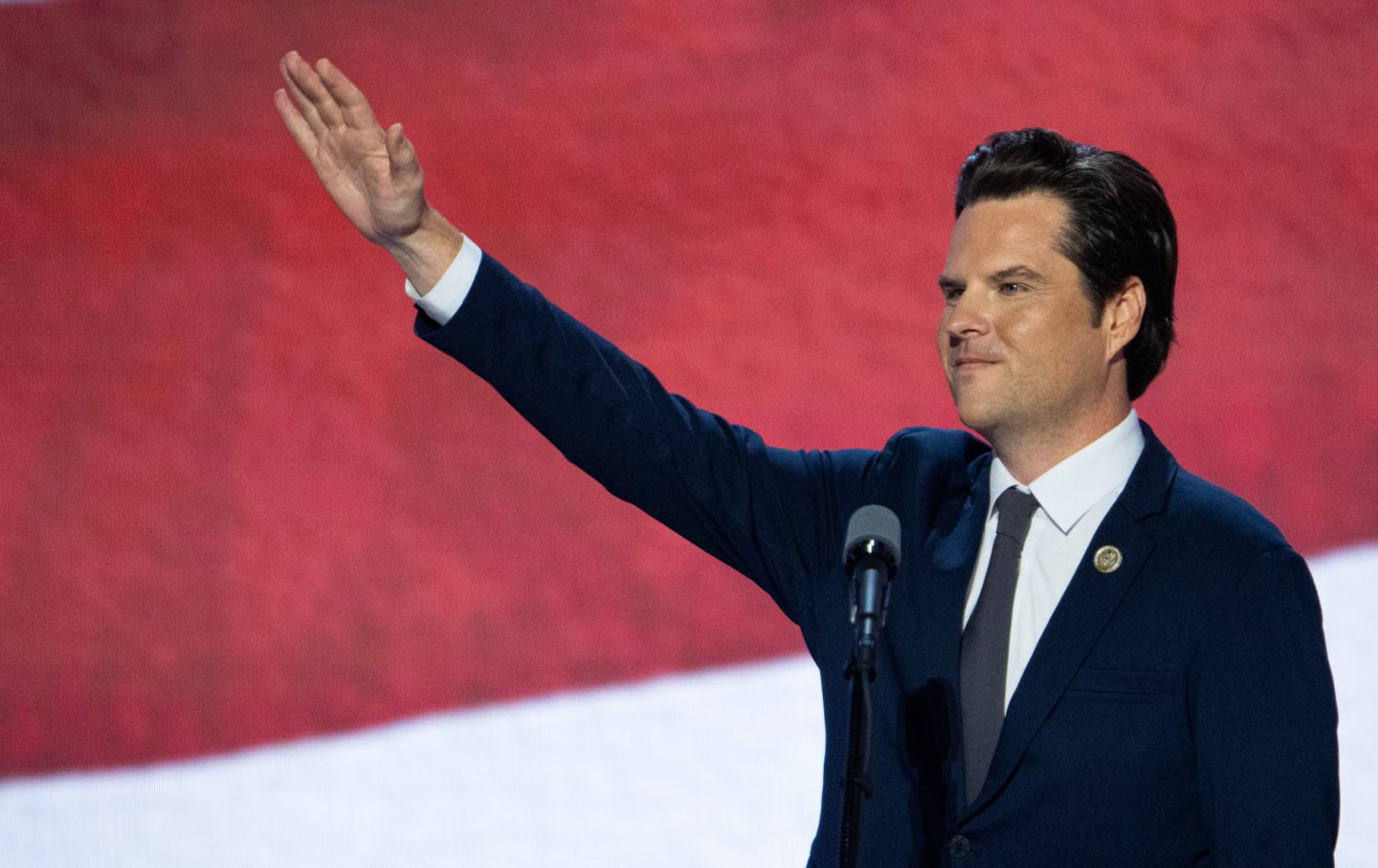
BREAKING: Matt Gaetz Quits, and Journalism Still Matters—a Lot BREAKING: Matt Gaetz Quits, and Journalism Still Matters—a Lot
Forty-five minutes after CNN contacted Trump’s attorney general nominee about additional allegations of sexual misconduct, he was done.

The Red Wave Didn’t Hit Statehouses in This Election The Red Wave Didn’t Hit Statehouses in This Election
State-level Democrats largely held their ground, even scoring key victories in battleground states—and under Trump, that’s going to matter.
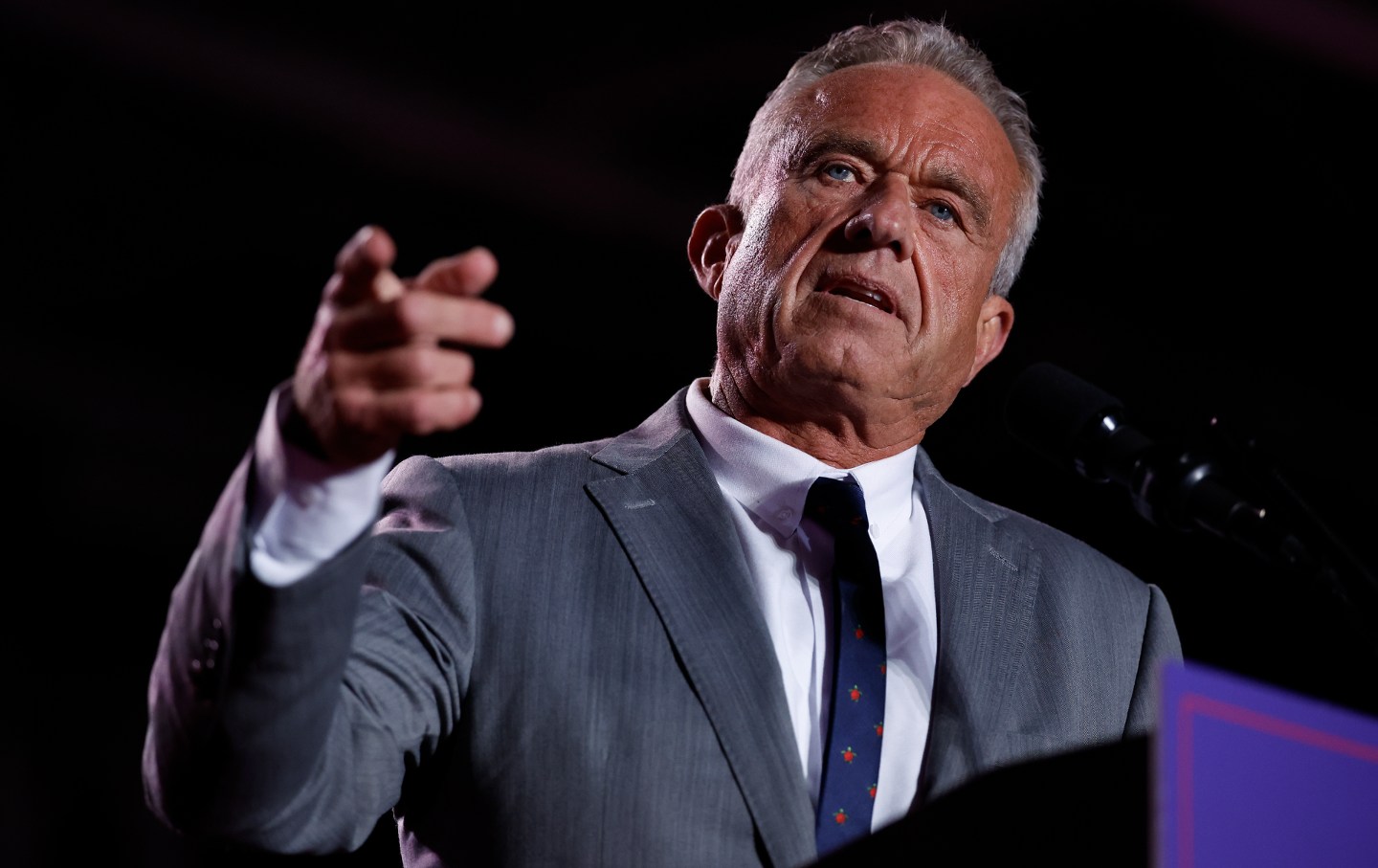
How Nominally Pro-Choice RFK Jr. Can Get Anti-Abortion Groups to Back His HHS Nomination How Nominally Pro-Choice RFK Jr. Can Get Anti-Abortion Groups to Back His HHS Nomination
He can pick a strident abortion opponent like Roger Severino, who wrote the Project 2025 chapter on HHS, as his number two.

Red Flags Red Flags
The result of the presidential election reflects individual and collective responsibility.


